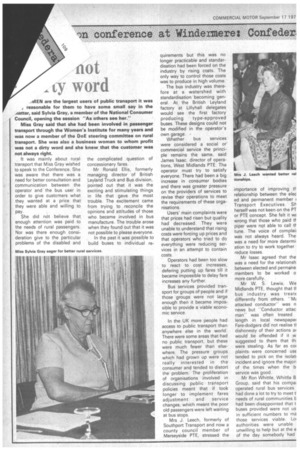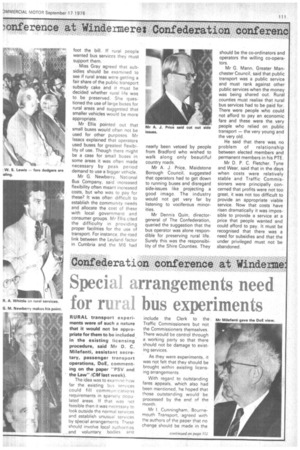.MEN are the largest users of public transport it was
Page 112

Page 113

If you've noticed an error in this article please click here to report it so we can fix it.
, reasonable for them to have some small say in the .natter, said Sylvia Gray, a member of the National Consumer Council, opening the session "As others see her."
Miss Gray said that she had been involved in passenger transport through the Women's Institute for many years and was now a member of the DoE steering committee on rural transport. She was also a business woman to whom profit was not a dirty word and she knew that the customer was not always right.
It was mainly about rural transport that Miss Gray wished to speak to the Conference. She was aware that there was a need for better consultation and communication between the operator and the bus user in order to give customers what they wanted at a price that they were able and willing to pay.
She did not believe that enough attention was paid to the needs of rural passengers. Nor was there enough consideration give to the particular problems of the disabled and the complicated question of concessionary fares.
Mr Ronald Ellis, formerly managing director of British Leyland Truck and Bus division, pointed out that it was the exciting and stimulating things in life that gave the most trouble. The excitement came from trying to reconcile the opinions and attitudes of those who became involved in bus manufacture. The trouble arose when they found out that it was not possible to please everyone.
In the past it was possible to build buses to individual re quirements but this was no longer practicable and standardisation had been forced on the industry by rising costs. The only way to control those costs was to produce in high volume.
The bus industry was therefore at a watershed with standardisation becoming general. At the British Leyland factory at Lillyhall delegates would see the first factory producing type-approved buses. These designs could not be modified in the operator's own garage.
Whether bus services were considered a social or commercial service the principle remains the same, said James Isaac, director of operations, West Midlands PTE. The operator must try to satisfy everyone. There had been a big increase in consumer bodies and there was greater pressure on the providers of services to revise their operations to meet the requirements of these organisations.
Users' main complaints were that prices had risen but quality had decreased. They were unable to understand that rising costs were forcing up prices and that operators who tried to do everything were reducing services in an attempt to contain costs.
Operators had been too slow to react to cost increases, defering putting up fares till it became impossible to delay fare increases any further.
Bus services provided transport for groups of people and if those groups were not large enough then it became impossible to provide a viable economic service.
In the UK more people had access to public transport than anywhere else in the world. There were some areas that had no public transport, but these were much fewer than elsewhere. The pressure groups which had grown up were not really interested in the consumer and tended to distort the problem. The proliferation of organisations involved in discussing public transport policies meant that it took longer to implement fares adjustment and service changes, which meant the poor old passengers were left waiting at bus stops.
Mrs J Leech, formerly of Southport Transport and now a county council member of Merseyside PTE, stressed the
importance of improving th relationship between the elec ed and permanent member r Transport Executives. Sh herself was not keen on the PT or PTE concept. She felt it wi wrong that those who paid tF piper were not able to call tltune, The voice of complail was not always heard. Thei was a need for more determi! ation to try to work together reduce losses.
Mr Isaac agreed that the was a need for the relationsh between elected and permane members to be worked o more carefully.
Mr W. S. Lewis, We Midlands PTE, thought that tl bus industry was treate differently from others. -Me attacked conductorwas n news but -Conductor attac manwas often treated length in local newspaper Fare-dodgers did not realise tl dishonesty of their actions ar would be offended if it yv suggested to them that thi were stealing. As far as cor plaints were concerned use tended to pick on the isolati incident and ignore the majori of the times when the b service was 'good.
Mr Ron Whittle, WhitCe B Group, said that his compel operated rural bus services had done a lot to try to meet t' needs of rural communities b had been disappointed that t buses provided were not us in sufficient numbers to ma those services viable. Loi authorities were unable unwilling to help but at the e of the day somebody had foot the bill. If rural people wanted bus services they must support them.
Miss Gray agreed that subsidies should be examined to see if rural areas were getting a fair share of the public transport subsidy cake and it must be decided whether rural rife was to be preserved. She questioned the use of large buses for rural areas and suggested that smaller vehicles would be more appropriate.
Mr Ellis pointed out that small buses would often not be used for other purposes. Mr lssacs explained that operators used buses for greatest flexibility of use. Though there might be a case for small buses in some areas it was often made necessary by peak period demand to use a bigger vehicle.
Mr G. Newberry, National Bus Company, said increased flexibility often meant increased costs, but who was to pay for these? It was often difficult to establish the community needs and allocate the cost of these with local government and consumer groups. Mr Ellis cited the difficulty in providing proper facilities for the use of transport. For instance, the road link between the Leyland factor in Cumbria and. the M6 had nearly been vetoed by people from Bradford who wished to walk along only beautiful country roads.
Mr A. J. Price, Maidstone Borough Council, suggested that operators had to get down to running buses and disregard side-issues like projecting a good image. The industry would not get very far by listening to vociferous minorities.
Mr Dennis Quin, directorgeneral of The Confederation, queried the suggestion that the bus operator was alone respondible for preserving rural life. Surely this was the responsibility of the Shire Counties. They should be the co-ordinators and operators the willing co-operators.
Mr G. Mann, Greater Manchester Council, said that public transport was a public service and must rank against other public services when the money was being shared out. Rural counties must realise that rural bus services had to be paid for. There were people who could not afford to pay an economic fare and these were the very people who relied on public transport — the very young and the very old.
He said that there was, no problem of relationship between elected members and permanent members in his PTE.
Mr D. P. C. Fletcher, Tyne and Wear, said that in the days when costs were relatively stable and Traffic Commissioners were principally concerned that profits were not too great, it was not too difficult to provide an appropriate viable service. Now that costs have risen dramatically it was impossible to provide a service at a price that people wanted and could afford to pay. It must be recognised that there was a need for subsidies and that the under privileged must not be abandoned.








































































































































































































